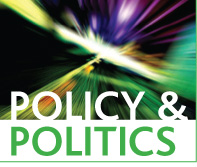Benjamin Ewert, Kathrin Loer and Eva Thomann
This section of Discover Society is provided in collaboration with the journal, Policy and Politics. It is curated by Sarah Brown.
Almost everyday, governments all over the world have to decide on policy interventions to keep infection rates for COVID-19 under control. Often, “nudges” are proposed, that use insights from behavioural science combined with the promise of an effective policy tool. In fact, the variety of policy instruments is not only rather vague and vast, but recognising this variety is also important for our aim that we set out in our forthcoming special issue: to develop an advanced understanding of Behavioural Public Policy and Administration (BPP).
Our premise is that BPP must move beyond ‘nudge’, the iconic but contested synonym for any policies that have been inspired by insights from the behavioural sciences so far. Based on a broad conceptual design and methodological pluralism, we suggest that behavioural policymaking must develop a more nuanced understanding of the interrelations between social structures and individual action in order to effectively tackle more complex policy problems. We reference the final chapter of Michael Hallsworth and Elspeth Kirkman’s recent book on Behavioural Insights, which we feel articulates eloquently what the future of behavioural insights could offer.
Evidence to support our arguments is plentiful and has been frequently cited by critical observers of the behavioural insights movement, but the example of the COVID-19 pandemic has ultimately proven that ‘nudge’ interventions are not a panacea. At first glance, there are good reasons to believe that the pandemic has significantly challenged behavioural policies. Since the outbreak of COVID-19, people across the globe are repeatedly reminded that to effectively contain the virus requires behavioural adaptions such as physical distancing, hygiene measures (e.g. hand washing) and wearing a mask. However, in contrast to ‘nudge theory’ that puts a strong emphasis on the non-coercive character of its suggested interventions, most of the behavioural tools currently being used to fight COVID-19 are strictly mandatory.
For example, in many countries (e.g. Germany, the UK) people are not gently nudged but forced by law to wear a mask on public transport. Likewise, at the outset of the crisis in the first half of 2020, physical distancing was ordered rather than recommended by lawmakers. As the pandemic has developed, similar mandatory interventions are being imposed by governments in lots of countries in the latter part of 2020. This is to say nothing of the mandatory lockdowns that accompanied these interventions. Thus, while most anti-COVID policies have behavioural implications and are evidenced by behavioural research, implementing them appears to require command-and-control instruments rather than so-called nudge approaches.
This is not least because there are heterogeneous attitudes within populations as to which behavioural adaptions to control the pandemic are considered appropriate and/or productive. Obviously, people who actively doubt that COVID-19 is a deadly disease are unlikely to wear a mask due to subtle behavioural cues (e.g. friendly reminders that refer to social norms such as ‘95% of your fellow citizens do wear a mask’). Having said that, we acknowledge the need to integrate behavioural assumptions and – if possible – insights to better understand how people are likely to behave in critical situations because of the lack of continuous monitoring and control in pandemic reality.
Indeed, the UK is an interesting case study for assessing the effectiveness of behavioural experts in controlling the transmission of COVID-19. In the country that has been a forerunner of behavioural insights, the pandemic has rather thwarted the track record of behavioural policymakers. For example, David Halpern, the former leader of UK’s Behavioural Insights Team (BIT), was accused of being partly responsible for ‘flawed policies over the coronavirus outbreak’. Halpern advised the British government in early March 2020 to pursue a relatively soft approach to allow sufficient herd immunity – a concept that, to be fair, does not emanate from behavioural sciences. Although Halpern revised his advice immediately as the public health crisis worsened, commentators concluded that ‘Nudge theory is a poor substitute for hard science in matters of life or death’. Hence, in the light of the pandemic, behavioural policies were deemed as a lightweight and rather irresponsible policy response. The take-away message to be drawn from the UK policy debate could be universalised: ‘Nudges against the pandemicpainfully demonstrated
COVID-19 provokes cyclical and interactive effects and suddenly changes the conditions at the macro and meso level: The (threat of the) pandemic has implications for every individual person and his/her actions at the micro-level that, in aggregate, produces new social outcomes at the macro-level—which, in turn, create new social facts: a ‘new normality’ emerges based on norms and rules for living together which differ significantly from routines that have shaped everyday life so far.
Following this argument, behavioural research can be used at the meso-level to produce concrete practical insights for the management and performance of decision-making in public health agencies. These insights can help us to better understand the success or failure of network collaboration. As developments in 2020 show, there is a need for continuous research and, most importantly, acceptance of the continuous development, analysis and refining of knowledge, which, in turn, has a big impact on the policy actions that result from this process. In practice, this means that both policy makers and policy targets must have a high degree of acceptance and adaptability and show the willingness to give up or discard previous assumptions and actions that were based on outdated findings.
Focusing on the macro level and adopting more of a normative perspective, behavioural concepts must also weigh social costs against social benefits when designing behavioural tools to fight the virus. As we make clear in our contribution to the special issue, an advanced model of behavioural public policy should integrate social factors that influence individual behaviours and must be considered in the design of thoughtful policies to meet the specific needs of certain groups in society. Behavioural insights may also help policymakers to understand the conditions under which public policy is perceived as representative and legitimate by citizens, which also needs to be continuously researched. Furthermore, broadening the conceptualisation of behavioural policymaking could contribute to a deeper understanding of how different societal contexts influence corona policies differently and what this means for designing those policies. This final point should be the most important factor when it comes to the needs of pandemic societies that face an uncertain future and a new reality in their everyday lives.
In conclusion, our behavioural model helps to understand the varieties of influences and interactions on behaviourally informed policies and paves the way for integrating them into policy mixes that include conventional instruments in order to also address structural aspects of policy problems.
Benjamin Ewert is in the Department of Nursing and Health Sciences at Fulda University of Applied Science. Kathrin Loer is a member of the Faculty of economics and Political Science at Osnabrück University of Applied Sciences and Eva Thomann is in the Department of Politics at the University of Exeter.

